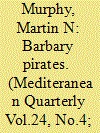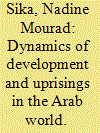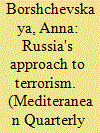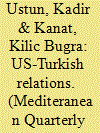|
|
|
Sort Order |
|
|
|
Items / Page
|
|
|
|
|
|
|
| Srl | Item |
| 1 |
ID:
126676


|
|
|
|
|
| Publication |
2013.
|
| Summary/Abstract |
This essay describes the piracy that took place in the Mediterranean from the time of ancient Greece to Barbary. It explains the corso, the sea war between nonstate but state-endorsed Christian and Muslim parties, with reference to the Knights of Malta and, more extensively, the Barbary corsairs. Although the essay focuses primarily on history, it also draws some conclusions about piracy and the international system today. The essay notes a prevailing assumption that contemporary piracy off Somalia and that perpetrated by the Barbary pirates is similar, but it further notes that any similarities are slight and superficial. At the same time, similarities rooted in economic, social, and political change do exist between all outbreaks of depredation at sea and the responses to them.
|
|
|
|
|
|
|
|
|
|
|
|
|
|
|
|
| 2 |
ID:
126680


|
|
|
|
|
| Publication |
2013.
|
| Summary/Abstract |
This essay examines the structural economic reform measures undertaken in the Arab world in the past two decades. Developmental projects in the region have attained growth in gross domestic product, higher levels of human capital, and stable governments. These, however, have been accompanied by corruption, structural economic problems, social exclusion, and negligence of good governance and the rule of law. This essay suggests that the juxtaposition of economic reform and liberalization with corruption, authoritarianism, and absence of good governance were a recipe for the social tumult that became the Arab Spring. Social unrest will remain the rule rather than the exception in the Arab region for the foreseeable future, especially in countries that have undergone regime change, such as Egypt and Tunisia, due to the lack of expected economic and political reforms.
|
|
|
|
|
|
|
|
|
|
|
|
|
|
|
|
| 3 |
ID:
126683


|
|
|
|
|
| Publication |
2013.
|
| Summary/Abstract |
A superficial look at Russia's current problems with terrorism and Muslim extremism may lead to the conclusion that the United States and Russia have similar views on this issue, which would therefore make them obvious partners in addressing the problems. Russian president Vladimir Putin promoted this position in the aftermath of the 11 September 2001 attacks in the United States and renewed this claim after the Boston Marathon bombing of April 2013. However, the Kremlin's view on terrorism is different from Washington's. The history of Russian domination and abuses in the Caucasus, the chaos and poverty that followed the breakup of the Soviet Union, and the Kremlin's human rights violations in Chechnya in many ways contributed to the rise of terrorism and Muslim extremism in Russia. In addition, the Kremlin uses terrorism as an excuse for an increased crackdown on civil society and for the lack of democratization in Russia. The Barack Obama administration therefore should have no illusions about the limitations on US-Russian cooperation on terrorism
|
|
|
|
|
|
|
|
|
|
|
|
|
|
|
|
| 4 |
ID:
126674


|
|
|
|
|
| Publication |
2013.
|
| Summary/Abstract |
In response to a widespread idea of the European Union as a "peace project," an idea disseminated especially after the EU received the 2012 Nobel Peace Prize, this essay retrieves some of the historical causes of the foundation of the European Economic Community (EEC) in 1957. The essay emphasizes specific geopolitical and colonial incentives that had lain behind the European integration project ever since the pan-European blueprints the interwar period and which became critical with the Suez crisis and decolonization movements of the 1950s. As the essay demonstrates, practically all of the visions, movements, and concrete institutional arrangements working toward European integration during this period placed Africa's incorporation into the European enterprise as a central objective. As much of the scholarly, political, and journalistic accounts at the time testify, European integration was inextricably bound up with a Eurafrican project. According to the intellectual, political, and institutional discourse on Eurafrica, a future European community presupposed the transformation of the strictly national colonial projects into a joint European colonization of Africa. Strong evidence suggests that these ideas were instrumental in the actual diplomatic and political constitution of the EEC, or of Europe as a political subject, in 1957. The essay discusses why the EU's colonial origins have been consigned to oblivion in mainstream research and why this history is of continued concern to the world.
|
|
|
|
|
|
|
|
|
|
|
|
|
|
|
|
| 5 |
ID:
126684


|
|
|
|
|
| Publication |
2013.
|
| Summary/Abstract |
US-Turkish relations are in the best shape of recent memory. President Barack Obama's first official overseas visit (in 2009) was meant to start a new type of relationship with Turkey, dubbed the "model partnership," but the bilateral relations received particular attention in the wake of two major diplomatic crises in 2010: a flotilla incident-when the ship the Mavi Marmara, owned by a Turkish nonprofit organization, was boarded by the Israeli military while on the way to Gaza with aid-and Turkey's "no" vote at the UN Security Council on sanctions against Iran. Both of these crises had to do with regional issues of vital importance for both the United States and Turkey. The Arab Spring that began in late 2010, however, created a new dynamic that rendered cooperation between the two countries critical.
|
|
|
|
|
|
|
|
|
|
|
|
|
|
|
|
| 6 |
ID:
126685


|
|
|
|
|
| Publication |
2013.
|
| Summary/Abstract |
The Israeli-Palestinian conflict is highlighted by numerous obstacles to peace. Each side must be willing to compromise and seek common ground in order to finally conclude this long-running dispute over territory. The window for resolution will not stay open forever, and, to meet in the middle, each side, but particularly Israel, must desist from maintaining its extreme positions.
|
|
|
|
|
|
|
|
|
|
|
|
|
|
|
|
|
|
|
|
|